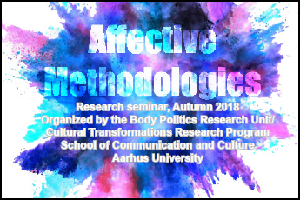Affective Methodologies
19 September – 21 November 2018, Aarhus (Denmark)
A series of research seminars organised throughout Autumn 2018 by the Body Politics Research Unit/Cultural Transformations Research Program, School of Communication and Culture of Aarhus University.
Emotions, embodiment and affects are important drivers in the experience economy, in creative industries in general, in global digital forms of communication, in the performative impact of art works, sound, noise and atmospheres, in the manifestation of contemporary social and political movements, and in political communication becoming predominantly populist. The methodological challenges to investigate new materialities and infrastructures, more-than-representational layers and their affective impact have been addressed by a first generation of affective methodology books (cf. Coleman & Ringrose (Eds.) 2013, Knudsen and Stage (Eds.) 2015, Vannini (Ed.) 2015). This seminar’s aim is to zoom further in on critical moments in capturing/producing empirical material for the study of affect and emotion – in order to rethink how to “stay with the trouble of affects” without reducing affects to discourses and without opposing a representational thinking with a non-representational thinking and without being satisfied by working on affects as forces that cannot be approached. It is necessary to reconsider all the steps in a research design in order to take the leap into the affective realms and in order to fully embrace the empirical opportunities of affective methodologies research.
Questions and key issues guiding the seminar:
• How to develop an affectively attuned research question? – in relation to wider, theoretically informed conceptual repertoires (charisma, crowd, event, rhythm, contagion, assemblage, networks, flows, hauntings, and so on).
• How to balance analytical needs of definition, delimitation, description with theoretical and/ or empirical openness, in-betweenness, excess, and so on?
• How to construct or capture empirical material for the study of affect or emotion in relation to repertoires of established methods or experimental approaches (e.g. auto-ethnography, creative methods, visual methods or practice-based research).
• How to analyze affects in mediated textualities (e.g. social media), across sensual modalities (audio, visual, tactile etc.) or within milieus configured by rhythms, atmosphere or im/material practice?
• How to read for affects in different types and genres of texts?
• How to work with and through
Click here to see the full program.
Click here to find out more about the 21 November ‘Art and methodology workshop’.

